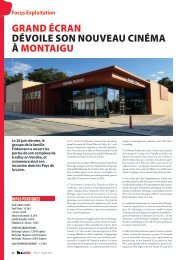You also want an ePaper? Increase the reach of your titles
YUMPU automatically turns print PDFs into web optimized ePapers that Google loves.
J<br />
|<br />
'<br />
,<br />
'<br />
FILM INDUSTRY <strong>PONDERS</strong> EFFECT<br />
OF <strong>TAFT</strong>-<strong>HARTLEY</strong> LABOR ACT<br />
Law Has An Immediate<br />
Effect on the Current<br />
Strike in Studios<br />
There is every indication that the Taft-<br />
Hartley labor act. passed by Congress over<br />
President Tiuman's veto this week, will<br />
have widespread repercussions throughout<br />
the motion picture business.<br />
Within 60 days, when most of the specific<br />
provisions of the act go into effect,<br />
the labor relations in the studios, at the<br />
home offices, and in exhibition across th-;<br />
country will undergo their most drastic<br />
change since the Wagner labor act went<br />
into effect a dozen years ago.<br />
UPPER HAND TO PRODUCERS<br />
Its immediate effect is to give producers<br />
a strong upper hand in dealing with studio<br />
unions which have been involved in a jurisdictional<br />
dispute for many months. The new<br />
law. in unequivocal language, makes the<br />
Jurisdictional strike an illegal act. Here the<br />
law is expected to accomplish what almost a<br />
year of continuous negotiations between<br />
unions and producers and conciliators has<br />
failed to do.<br />
The new law prohibits "featherbeddmg,"<br />
eliminates the closed shop, forces unions to<br />
bargain collectively with employers, makes<br />
unions liable for damage suits in jiurisdictional<br />
strikes and for breach of contract,<br />
permits the government to obtain injunctions<br />
again.st unions to stall off a strike for 80<br />
days, and contains a number of other provisions<br />
that will have an effect in employeremploye<br />
relations in the film industry.<br />
There were no immediate comments from<br />
either the film companies or the unions, except<br />
that there was every indication that<br />
interpretations of the law will be many, that<br />
most of them will wind up in the courts for<br />
decision. Various labor leaders, although<br />
none in the motion picture mdustry itself,<br />
already have indicated a desire to test the<br />
provisions in the courts. The year promises<br />
to be one of legal maneuverings in the field<br />
of labor law.<br />
AFFECTS 17 STUDIO UNIONS<br />
The clo.sed shop provision of the law will<br />
affect 17 of the 40 unions m the studios, and<br />
many others in distribution and exhibition.<br />
All contracts which existed on June 23, when<br />
the Taft-Hartley bill became law, continue<br />
until they expire. For 60 days after June 23,<br />
It is permissible to sign clo.sed shop agreements,<br />
but for no longer than one year.<br />
When the 60-dny period is up. no new contracts<br />
with this provision may be signed,<br />
nor may old ones be renewed. All lATSE<br />
projectionists, for Instance, who now hold<br />
closed shop agreements with exhibitors will<br />
not be able to retain this provision after<br />
present contracts are up.<br />
The new law also presents the problem of<br />
Industrywide contractual negotiations, which<br />
have been a pattern In many levels of the<br />
motion picture business. Under the act. a<br />
union may not force an employer to bargain<br />
through an Industrj'wlde a.ssociatlon of employers<br />
If he prefers to bargain by himself.<br />
It probably Is permissible, but cannot be<br />
mandatory.<br />
This happens to be an Immediate problem<br />
facing the American Guild of Variety Art-<br />
Provisions Directly<br />
Affecting Industry<br />
Unions cannot bargain for foremen or<br />
supervisors. This may prevent theatre<br />
managers and other key supervisory employes<br />
from forming unions to bargain<br />
with e.vhibitors.<br />
Unions cannot force an employer to<br />
pay for services not performed. This is<br />
aimed at "featherbedding." It is expected<br />
to strike at such industry practices<br />
as standby orchestras, standby stagehands,<br />
etc.<br />
Jurisdictional strikes are illegal. A<br />
union cannot strike or boycott to force<br />
an employer to assign work to one union<br />
instead of another. This will affect the<br />
current Hollywood studio strike.<br />
Unions are prohibited from restraining<br />
or coercing an employer in his choice of a<br />
union with which to deaL In effect, this<br />
means that a union cannot strike to force<br />
a company to bargain through an industrywide<br />
association of employers instead<br />
of bargaining by himself. This restriction<br />
may affect industrywide contracts<br />
with such groups as the Screen<br />
Actors Guild, Screen Extras Guild, Screen<br />
Publicists, etc., and the studio crafts.<br />
Closed shop clauses will not be permitted<br />
in new contracts. Of the 40 unions<br />
at the studios, 17 have closed shop provisions<br />
in their contracts. This provision<br />
also will concern many of the I.ATSE<br />
contracts now in force throughout the<br />
industry.<br />
Union shop provisions, i. e„ workers<br />
must join the union within a specified<br />
period after being employed, may be<br />
included in contracts only if a majority<br />
of the emplo.ves vote for a union shop<br />
in an NLRB election.<br />
Damage suits may be filed against<br />
unions for breach of contract, jurisdictional<br />
strikes and boycotts. This is a provision<br />
which would allow studios to sue<br />
for damages in the event production was<br />
disrupted in a labor situation as currently<br />
exists on the west coast.<br />
Employes holding executive posts in<br />
unions .seekins recognition must file<br />
affidavits disclaiming membership in the<br />
Communist party or any group favoring<br />
overthrow of the government by force.<br />
Ists, known as AGVA. Matt Shelvey, national<br />
administrative director of the organization,<br />
said that the law may affect pending<br />
contracts covering 20 presentation houses<br />
operated by RKO, Warners, Paramount and<br />
Loew's. Pacts were agreed upon several<br />
months ago, but actual signing was delayed<br />
pending outcome of the Taft-Hartley bill.<br />
Shelvey said the union's lawyers will meet<br />
with circuit lawyers to determine whether the<br />
law prohibits a single contract for several<br />
circuits operating interstate. The union is<br />
prepared to negotiate separate agreements<br />
for each presentation theatre If the decision<br />
Is that clrcultwlde pacts are Illegal.<br />
Unions which will be hard hit by the closed<br />
shop provisions are the lATSE, Associated<br />
Actors and Artistes of America (AAAA), and<br />
' 1;<br />
the American Federation of Labor Th<br />
overwhelming majority of these unions a'<br />
of the closed shop variety and the remamd<br />
are union shop.<br />
,<br />
Along the home office front, officers or<br />
United Office and Professional Workers<br />
America iCIOt, and its locals, the Sere.<br />
Publicists Guild, and the Screen Office ai<br />
Professional Employes Guild already ha<br />
held meetings in New York to discuss pli<br />
to fight for repeal of the law. and to jo'<br />
with other unions in seeking defeat of co<br />
gressmen who supported the veto. The la<br />
however, says unions cannot spend mon<br />
or make contributions for political car<br />
paigns and one of the points of strateg)-<br />
be discussed is how to provide labor n<br />
financing for its campaign.<br />
NEW COAST DEVELOPMENT<br />
Meanwhile, on the west coast, there wii<br />
second development on the week's lal<br />
front. It concerned the brief probe cc<br />
ducted in Hollywood by representatives<br />
the House labor committee, Congressir,<br />
Carroll D. Kearns and Congressman Irv<br />
McCann. Following their shortlived inu.<br />
gation, the pair returned to Washim:-<br />
promising to return within a month to :<br />
ther propose the possibilities of racketet:<br />
within film capital labor circles and metr.<br />
Whether the enactment of the Taft-Har<br />
bill will make such further probing nece.v<br />
is still to be determined.<br />
While on the coast, the congressmen he<br />
testimony from Pat Casey, retiring ;a<br />
chief for producers: I. E. Chadwick. pr^<br />
dent of the Independent Motion Picture P<br />
ducers Ass'n; Ray Young. Eagle-Uon 1* i<br />
head: Fred Steele. Monogram's studio m* I<br />
ager: Edward Nassour, owner of the Nas*(<br />
studio: Chris Beute, studio manager, h^<br />
tion Picture Center: and Herman Dt<br />
stein. Pine-Thomas business manager.;<br />
Featherbedding Is Out<br />
In New Ohio Labor Act<br />
j<br />
COLUMBUS—Featherbedding practice*<br />
theatres, such as standby orchestras a'l<br />
extra stagehands, will be prohibited ua"<br />
terms of the Van Aken labor bill passed.'<br />
the Ohio legislature and awaiting OoTeri<br />
Herbert's signature. Strikes in support) j<br />
such practices are specifically forbidden. 1<br />
"Any strike to compel an employer to<br />
money for services not performed or to f* ,|<br />
employment of any person or persons not<br />
quired, or to use material or equipment,<br />
required by the employer," is forblddec^<br />
this language.<br />
Unfair labor practices of both emplft<br />
j<br />
and employes are defined In the bill, i<br />
|<br />
ployers are forbidden to interfere Inu<br />
organization, to use the "yellow dog"<br />
tract, to fire workers for filing charges it<br />
the act and to refuse to bargain collect<br />
with union representatives. Employes<br />
forbidden to use violence in picketlnf<br />
engage in illegal picketing: to partld<br />
in sympathy, jurisdictional or sitdownst,<br />
or secondary boycotts: to strike in suppo<br />
featherbedding practices, or to strike to<br />
pel employers to recognize a represent,<br />
not chosen by a majority of the workers<br />
Unions may be sued for injurj' caust<br />
"person or property" by such illegal st<br />
Fines may be levied against imlons If<br />
are found guilty under terms of the i><br />
8 BOXOFFICE :<br />
: June M.

















